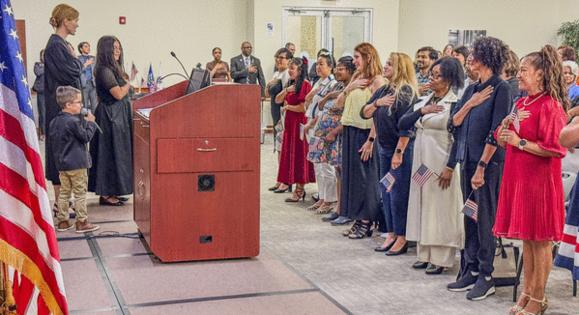Trump administration moves to make US citizenship harder with revised civics test
Published in News & Features
The Trump administration moved again Wednesday to make it harder to gain U.S. citizenship, announcing a slate of changes to the core civics test that immigrants must pass to be naturalized.
The changes would expand the number of questions immigrants need to be prepared to answer, and increase the number of questions they must answer correctly in order to pass.
The changes, announced as pending in the Federal Register, would largely revert the test to a similarly longer and harder version that was introduced in 2020 during President Donald Trump's first term, but was swiftly rolled back under President Joe Biden in 2021.
The shift follows other Trump administration changes to the process by which U.S. Citizenship and Immigration Services officials determine whether prospective citizens are qualified, including enhanced assessments of their "moral character" and whether they ascribe to any "anti-American" beliefs, and intense checks into their community ties and social media networks.
It also comes amid a broader crackdown on undocumented immigration, and what Trump has said will be the largest "mass deportation" in U.S. history. That effort has been heavily centered in the Los Angeles region, to the consternation of many Democratic leaders and immigration advocacy organizations.
The new naturalization test, like the short-lived 2020 version, would draw from 128 possible questions and require prospective citizens to answer 12 out of 20 questions correctly in order to pass. Under the current test, which dates to 2008, there are 100 possible questions, and prospective citizens must answer six out of 10 correctly.
Trump administration officials said the new test "will better assess an alien's understanding of U.S. history, government, and English language," and is part of a "multi-step overhaul" of the citizenship process that will ensure traditional American culture and values are protected.
"We are doing everything in our power to make sure that anyone who is offered the privilege of becoming an American citizen fulfills their obligation to their new country," Department of Homeland Security Assistant Secretary Tricia McLaughlin said in a statement.
Immigration advocates cast the change as an attempt by the administration to further impede the legal pathway to citizenship for hardworking immigrants already deeply rooted in the U.S. They say it is part of a broader, authoritarian campaign by Trump and his administration to vet potential new citizens and other legal immigrants for conservative ideology and loyalty to him — all while the administration aggressively targets people for deportation based on little more than the color of their skin and the work that they do.
"The Trump administration lauding the privileges of becoming a U.S. citizen — while making it harder to obtain it — rings hollow when you consider that it is also arguing before the Supreme Court that law enforcement can racially profile Latines," said Jennifer Ibañez Whitlock, senior policy counsel at the National Immigration Law Center. "All this does is make it harder for longtime residents who contribute to this country every day to finally achieve the permanent protections that only U.S. citizenship can offer."
Earlier this month, the Supreme Court's conservative majority ruled in a case challenging immigration raids in California that immigration agents may stop and detain people they suspect are in the U.S. illegally based on little more than the color of their skin, their speaking Spanish and their working in fields or locations with large immigrant workforces.
Last month, USCIS announced that it was ramping up its vetting of immigrants' social media activity and looking for "anti-American ideologies or activities," including "antisemitic ideologies." That announcement followed months of enforcement against pro-Palestinian student activists and other U.S. visa and green card holders that raised alarms among constitutional scholars and free speech advocates.
Trump administration officials have rejected such concerns, and others about raids sweeping up people without criminal records and racial profiling being used to target them, as part of a misguided effort by liberals and progressives to protect even dangerous, undocumented immigrants for political reasons.
In announcing the latest change to the naturalization test, Homeland Security said it would make the test more difficult, and in the process ensure that "only those who are truly committed to the American way of life are admitted as citizens."
The department also lauded its recent moves to more deeply vet prospective citizens, saying the new process "includes reinstating neighborhood interviews of potential new citizens, considering whether aliens have made positive contributions to their communities, determining good moral character, and verifying they have never unlawfully registered to vote or unlawfully attempted to vote in an American election."
In rolling back the first Trump administration's test — which is very similar to the newly proposed one — USCIS officials under the Biden administration said that it "may inadvertently create potential barriers to the naturalization process."
By contrast, the agency under Biden said the 2008 test — the one Trump is now replacing again — was "thoroughly developed over a multi-year period with the input of more than 150 organizations, which included English as a second language experts, educators, and historians, and was piloted before its implementation."
©2025 Los Angeles Times. Visit at latimes.com. Distributed by Tribune Content Agency, LLC.







Comments